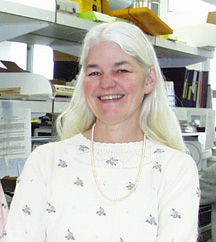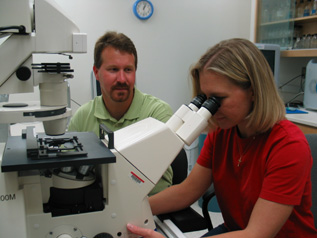 |
Margaret Wheelock, Ph.D. |
The grant establishes an NIH-designated Nebraska Center for Cellular Signaling at UNMC, and is the second largest new grant in history received by UNMC.
Funded by the Centers of Biomedical Research Excellence (CoBRE) program, an NIH-supported program, it also is the second CoBRE grant recently received at UNMC. A grant for $10.6 million was received earlier for the NIH-designated Nebraska Center for Molecular Biology of Neurosensory Systems.
Improving the health of Nebraskans
Margaret Wheelock, Ph.D., professor of oral biology, UNMC College of Dentistry, is principal investigator of the latest grant and director of the new Nebraska Center for Cellular Signaling. The center will focus on the study of cell signaling, and will expand cellular signaling research of talented junior researchers to foster new research initiatives that ultimately will improve the health of Nebraskans and people around the world. Research projects will focus on relation to head and neck, prostate, colon, skin cancer and cancer in general.
“I’m delighted that Dr. Wheelock and her associates have received this large grant award which in essence recognizes the excellence and importance of the science involved in the project and its potential for developing new, innovative scientists,” said UNMC Chancellor Harold M. Maurer, M.D. “These new scientists themselves will become independent researchers. What is equally impressive and unique is that this award is the second large COBRE grant from the NIH to UNMC in one month. I find our scientists truly amazing.”
Cell signaling — a growing area of research
Researchers from UNMC, the University of Nebraska-Lincoln and Creighton University, will lead five research projects within the grant. Each project involves the study of cellular signaling with a focus on its role in producing tumors. Cell signaling — the biochemical response of cells to their environment — is a rapidly growing area of national research due to scientific and technological advances made in the last 10 years.
 |
James Wahl, Ph.D., left, and Tammy Delmaire, graduate student, with one of the tools they use to study cells in the laboratory of Dr. Peggy Wheelock. |
“This grant will allow us to bring together outstanding junior and senior faculty with similar interests, which will greatly enhance the science knowledge and opportunities for more collaboration.” Dr. Wheelock said. “It will increase the research profile of Nebraska’s dental schools and develop junior researchers. We also will be working toward attracting more grants and researchers long after the COBRE grant concludes.”
Understanding the biological process of cancer
Dr. Wheelock said the significant level of common themes among the five research projects strengthens the work, with the goal to further the understanding of the biological process of cancer.
“Normally, cells in the body signal to one another. During the cancer process, cell signaling goes awry. We’re studying what’s gone wrong in the signaling pathways when cells grow more rapidly and divide. If we can modify the information pathway in the cells, perhaps we can decrease the potential of the cancerous cell to spread,” Dr. Wheelock said. “Our clinicians have a lot of burning questions. If we could say ‘this cell does this or that,’ the patient could be saved a lot of trauma. Getting this grant has been one of our goals. We have the right people. That’s exciting for the future.”
A history of NIH support
“Dr. Wheelock has a long history of grant support from the National Institutes of Health, significant peer review experience and is committed to training and promoting junior investigators,” said Thomas Rosenquist, Ph.D., UNMC vice chancellor for research. “She has identified highly qualified junior faculty members whose research focuses on cellular signaling and has also gathered an experienced group of mentors whose expertise covers a number of areas of cell signaling.
“Cell signaling is a burgeoning area of national research,” Dr. Rosenquist said. “This grant is extraordinarily valuable. This is where all the thinking outside the box pays off.”
Others praise UNMC’s work
“This grant is representative of NIH’s confidence in the innovative work conducted by UNMC and its partners in science,” said U.S. Sen. Ben Nelson. “It is no surprise that UNMC has again been recognized as a preeminent institution by its peers.”
U.S. Sen. Chuck Hagel said the grant shows UNMC has the confidence of the NIH. “The cutting edge work happening at UNMC will benefit greatly Nebraskans and the rest of our country.”
U.S. Rep. Lee Terry, said the state can be proud of the milestone. “UNMC has established a national reputation as a leader in cutting-edge medical research,” Rep. Terry said. “This grant is further proof of that. The entire state of Nebraska can be proud. The fact that other local institutions — such as Creighton University — will take part in the research spurred by this grant spotlights the outstanding medical expertise in Nebraska.”
Single largest research grant for COD
“This is by far the single largest research grant the UNMC College of Dentistry has ever received, and is a major step in our research advancement,” said John Reinhardt, D.D.S., dean of the UNMC College of Dentistry. “With this financial support and the collaboration of senior and junior scientists and clinicians, we will establish a strong program of excellence for the study of oral cancer.
“The goal is to develop researchers and produce research that may lead to earlier diagnosis or new treatments for oral and other cancers. Dentists are often on the front line of diagnosis for cancers of the head, mouth, neck, and throat. Nearly 8,000 people in the U.S. die of oral and pharyngeal cancers each year. Oral cancers are particularly aggressive; the overall 5-year survival rate is only 52 percent, worse than cancers of the breast, uterus, colon, and prostate,” Dr. Reinhardt said.
Project leaders
Project leaders of the center’s first five grants are: James Wahl, Ph.D. and Sreenivas Koka, D.D.S., Ph.D., UNMC College of Dentistry department of oral biology; Melanie Simpson, Ph.D., University of Nebraska-Lincoln; and Laura Hansen, Ph.D. and Bhakta Dey, Ph.D., Creighton School of Medicine department of biomedical sciences.